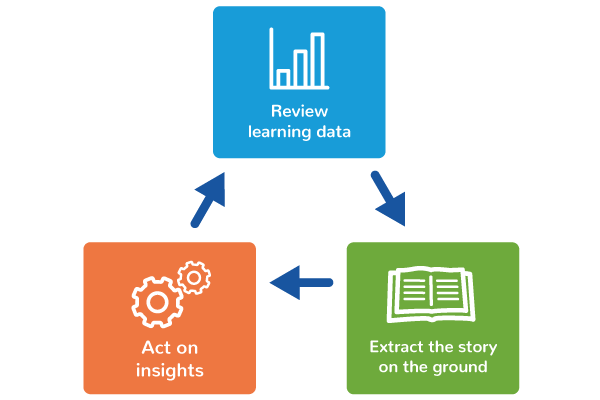The UK government has issued a blueprint for the expansion of educational technology, in a strategy document published by Damian Hinds, Secretary of State for Education. Last year, Hinds challenged the industry to launch an education revolution. Now he has provided a comprehensive strategy that recognises the potential for technology to contribute to improved educational outcomes, as well as the barriers it must overcome to achieve that potential.
The document, Realising the potential of education technology, lays out a vision for enhancing the integration of technology within education settings, along with a lengthy list of commitments by the government designed to translate technology’s potential in education into impact and to boost the British EdTech industry. In brief, the government wants to support the education sector to develop and embed technology in a way that cuts workload, fosters efficiencies, supports inclusion and ultimately drives improvements in educational outcomes.

These are aims that we, at Whizz Education, believe all governments should aspire to and that EdTech innovators should be held accountable to.
- In our view, the government is focused on exactly the right aims, namely:
- The removal of barriers to the good use of technology;
- Encouragement of teacher professional development;
- Support for effective procurement and promotion of high standards of cybersecurity;
- Further broadband infrastructure improvements for many more UK schools;
- Online training courses for teachers and education administrators;
Furthermore, the establishment of demonstrator schools to showcase best practice and the Data Protection toolkit for schools are all initiatives the government is poised to lead on.
Whizz Education has, from its early days, sought out opportunities to deploy its services in the global market for educational technology, so we applaud the government’s recognition that nurturing success in UK EdTech can drive international expansion. We have benefited from the UCL Educate programme and from DIT and BESA support of sales initiatives outside the UK, and are actively seeking to prove that at least some of the DfE’s EdTech challenges highlighted in the government’s strategy can be achieved beyond the shores of England by 2021.
Whereas in our initial years of promoting the Maths-Whizz Tutor, our emphasis has tended to be on the benefits it brought to students – engagement through world-class content, identification of each student’s knowledge gaps, adaptive learning pathways that support a rounded learning profile – we have also been able to show its value as a virtual teaching assistant. The DfE’s Challenges #1 and #3, concerning improved parental communication and engagement with reduced teacher workload and the cutting of teacher time spent on assessment and homework preparation, marking and analysis are major by-products of the Maths-Whizz virtual tutoring system. Powerful reporting is the bedrock of the “triangle of success” which we have always believed can be nurtured among students, parents and teachers. Moreover, continuous assessment of each individual student is the source of rich, comparative real-time learning data that, when properly implemented, can be a significant time-saver for teachers.
Our experience in large implementations is that impact is maximised when data combines with field observation to inform actionable insights. The sweet spot of educational technology is reached through continuous course correction of a product or service, which we have highlighted in our whitepaper Data to Insight to Action, where improvements are made in increments and evaluated on an ongoing basis. We wholly endorse the Government’s Edtech Framework for Change in which Step 3, following the setting of the vision and the development of the implementation strategy, becomes Implement, Integrate, Iterate and Innovate. This is the virtuous circle at the heart of Whizz’s educational approach.

We are also delighted to see that DfE plans to work closely with DFID’s EdTech Research and Innovation Hub which is investing £20 million over 8 years to form a global “what works” evidence hub to catalyse innovation in the education sector. This programme, a partnership with the World Bank, will not only seek to identify what works to accelerate, spread and scale EdTech interventions delivering better learning outcomes in developing countries but also which interventions present the greatest value for money and social return on investment. Raising educational outcomes in a manner that provides excellent value for money should be seen as the educational technology industry’s ultimate challenge. It remains Whizz Education’s principal raison d’être.
The DfE is keen on the term impact – it features in the EdTech strategy document twenty-three times. How impact is defined will influence the way EdTech solutions are designed and implemented. If impact simply pertains to high-stakes test scores, then that’s where EdTech will converge, because the commercial imperative will be to retrofit solutions to meet the particular needs of exam performance. We’ll be left with a raft of test preparation platforms. Instead, we encourage the DfE to define impact in terms of the quality of learning and teaching and to embrace the potential of technology to transcend contemporary debates on assessment. Our experience shows that the goals of reducing teacher workload, raising student achievement and holding schools accountable – often at odds with one another – can all exist in harmony through the use of technology-enabled formative assessment.

Innovation allows us to peer into the future contemplating new solutions to age-old problems. We hope that the DfE will back the intent of its strategy document with the courage to embrace those solutions.
